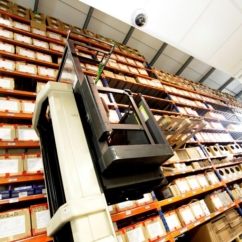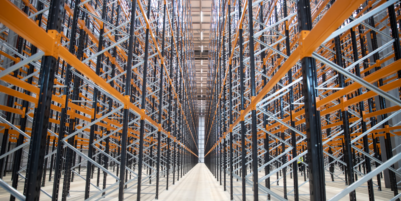-
BLACKOUT TECHNOLOGIES TARGETS TELEMATICS-INTEGRATED MOBILE DEVICE BLOCKING TO COMBAT SMARTPHONE DISTRACTION - April 1, 2025
-
OpenADR Alliance announces first OpenADR 3.0 certified products with EVoke Systems, E.ON Energy and Universal Devices - March 25, 2025
-
Growing fulfilment and contract packer appoints new Managing Director - March 25, 2025
-
When is it time to invest in a WMS? Understanding the key trigger points - March 25, 2025
-
eCapital helps Vantage Recruitment on its journey to financial success - March 24, 2025
-
Hugo Beck Celebrates 70 Years of Packaging Innovation with Open House Events - March 20, 2025
-
PROLOG FULFILMENT SUPPORTS LUNA DAILY’S COMMITMENT TO BETTER BODY CARE FOR ALL WOMEN - March 19, 2025
-
Motion Ventures launches largest-ever maritime tech fund at $100M to meet the industry’s new pace of adoption - March 18, 2025
-
ITD GLOBAL APPOINTS GROUP CHIEF REVENUE OFFICER - March 17, 2025
-
SURECAM TEAMS UP WITH ENTERPRISE FLEX-E-RENT FOR VEHICLE REPAIR & MAINTENANCE CONFERENCE - March 14, 2025
The relatively recent US imports ‘Black Friday’ and ‘Cyber Monday’ are now firmly established as important dates in every bargain-conscious Brit’s diary. And, with the countdown to the annual festival of consumption known as Christmas beginning shortly after these two high profile sales events, the final quarter of each year has traditionally been a bonanza for online retailers.
With more people shopping online than ever, there is a feeling that Q4 2021 could be a bumper period for e-commerce. This means it is more important than ever that sellers make every effort to ensure that their logistics operations and supply chain processes are primed and ready to deal with any anticipated surge in orders.
“Logistics is likely to be the biggest single operational issue to impact on an e-commerce seller’s Q4 performance this year,” says Charlie Walker, Head of Marketing at Berkshire-based fulfillment specialists, Walker Logistics.
He continues: “Get your logistics right and the prospect of a deluge of incoming orders should hold no fear. However, failing to properly pre-plan – either with your in-house packing and dispatch team or, if you use one, with your third party logistics (3PL) fulfillment partner, could result in an outcome that is less than positive.”
But as Q4 approaches various factors, such as a global shortage of freight containers, port problems, the well-documented lack of HGV drivers and, of course, the pandemic, are all having a disruptive effect on many supply chains.
In addition, the gradual return of the high street following the collapse of footfall at the height of the lockdown, is adding further pressure. As a result, some already strained retail warehouses are struggling to balance the twin demands of getting pallet loads of replenishment stock to retailers and fulfilling online orders direct to the consumer.
“To ensure that they enter Q4 with the best possible chance of fulfilling every order on time, internet sellers that use the services of a dedicated logistics specialist should ensure that they communicate all relevant information – no matter how trivial – about their targets and expectations for the period,” says Charlie Walker.
He goes on: “Regular forecasting and planning meetings are one of the cornerstones of any successful relationship between an internet retailer and its fulfilment partner and during the busiest periods, such as Q4, it is particularly vital that the 3PL is made aware of anything that is likely to impact upon inbound or outbound orders at the earliest opportunity if optimum service levels and pre-agreed KPIs are to be maintained.”
According to Charlie Walker, there are plenty of things an online trader should always strive to flag up to its 3PL partner that might impact upon Q4 activity. For example, are any marketing campaigns or other promotions planned that will drive sales?
Of course, if a retailer is going to be in a position to impart the kind of useful intelligence that its 3PL partner needs, it must first ensure that its own internal lines of communication are flowing openly.
“It is surprising how many companies – often the biggest firms – create their own supply chain planning problems by failing to communicate between departments or across regional operations,” says Charlie.
“For example, during last year’s Black Friday peak period one of Walker’s clients experienced an increase in online orders way in excess of what had been anticipated. It transpired that the company’s global parent had held a ‘flash’ 40 per cent off everything internet promotion – but had failed to mention it to its subsidiaries!”
Charlie Walker is quick to add that 3PLs need to be honest with their retail clients too and must work closely with them to highlight any potential pinch points in their process that might result in delays – particularly at peak periods.
“For example,” he says, “at the busiest times, 3PLs need to assess if any temporary staff that have been added to the workforce are capable of achieving the same pick rates as their more experienced colleagues. If the answer is ‘no’ this is likely to result in delayed order dispatch.”
“Accurate Q4 forecasting can, of course, be a challenge. However there is no excuse for a lack of communication between a 3PL and its internet retail client. The saying goes ‘failing to plan is planning to fail’ but for retailers and their logistics partners it might be adjusted to ‘failing to communicate your plan is planning to fail.’ That is especially true as we approach Q4 and what, for many, is the busiest time of the year.”

































